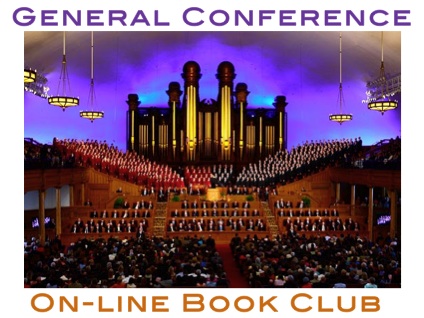(find the talk here)
Let me tell you a secret. The first part isn’t so much a secret – I like to run. I have been running consistently for several years now, and I really enjoy it. It gives me a chance to get out and be on my own for a little while, and when I am running outside (my very favorite place to run) I get to see the beautiful reflections of God’s love for us, evident in this wonderful world He created for us.
The secret part is that when you see me with my headphones on while I’m running, don’t assume I’m listening to some 80’s rock (my favorite running music). More often than not (unless I’m running a race) I’m probably listening to General Conference talks.
What’s interesting is that I just listened to Elder M. Russell Ballard’s talk during my recent run – and I don’t remember any of it, except the story of the gold prospector, and the part about how we need to serve others in our community to help spread the gospel throughout the world.
So I was excited to read it. And then I read it. And nothing stood out to me. Which is weird, because usually when I read the talks from General Conference I love them. Not this one. Of course, I knew it was all true, and I kind of got excited when Elder Ballard started talking about how charity begins at home. But he only spent a few sentences talking about that, and moved on. It felt like he briefly touched on many different small “nuggets” of truth, and didn’t really expound on any of them. At first, I was disappointed, because I love delving into the doctrine of the gospel, especially when my study is led by a prophet and apostle. But then as I read Elder Ballard’s testimony at the end of his talk, I realized how appropriate it was for him to touch on all these nuggets, especially in light of how he told the story of how the young man panning for gold was looking for nuggets, and was missing all the flecks of gold.
I am like that a lot. I look for the nuggets and miss the flecks. I want to know the “big things” that will make me a good person. Especially in mothering. I feel guilty because I don’t do huge activities with my kids every stinking day. Half the time I don’t even really play with them one-on-one. I feel like I’m failing them. But then when I add up all the small “flecks” of fun things I do with my children, even just acknowledging them and the things they say, and including them in my activities as I clean the house and do chores, I know those things are adding up for my kids and their lives are being filled with all the flecks of gold that I can give them.
Elder Ballard spoke directly to my perceived dilemma right from the start of his talk, “Against this beautiful backdrop of spring and its symbolism of hope, there is a world of uncertainty, complexity, and confusion. The demands of everyday life—education, jobs, raising children, Church administration and callings, worldly activities, and even the pain and sorrow of unexpected illness and tragedy—can wear us down.” (emphasis added) I have felt the “uncertainty, complexity, and confusion” of this world all too well in the past few months. Just when I think I have things figured out, something goes “wrong” and I feel my life spiraling out of control. But it doesn’t have to be that way.
Elder Ballard said, “Brothers and sisters, the gospel of Jesus Christ is simple, no matter how much we try to make it complicated. We should strive to keep our lives similarly simple, unencumbered by extraneous influences, focused on those things that matter most.” (emphasis added) You’d think that after President Uchtdorf’s talk last fall, we would have ‘things that matter most’ down to an art. For some reason, I keep forgetting, and I need to be reminded at every General Conference.
Like I said, Elder Ballard’s talk was a collection of gold flakes, and taken together, you can see the importance of the principle he spoke about – love and charity for one another. My favorite flake was a quote from the Book of Mormon about how to receive this gift of love and charity. “…pray unto the Father with all the energy of heart, that ye may be filled with this love…” I don’t know any other way to receive spiritual gifts. We can’t just read a self-help book and suddenly have spiritual gifts. Really, we can’t do anything of our own power. Everything we have, and everything we are, is through the Savior, Jesus Christ. Why should being able to express love and charity be any different? We have to pray for spiritual gifts. Patience and love for my children and my husband are probably the number one topics of my prayers to Heavenly Father. Mostly because I struggle with the patience part, but also because I know where patience comes from. I don’t just work hard at it and have it. Sure, I should work at it, but unless I am blessed with that gift from Heavenly Father, all my hard work won’t be enough.
How do you receive spiritual gifts? Do you pray for the gift of charity in your daily prayers? What flakes of spiritual gold did you find in Elder Ballard’s talk?

